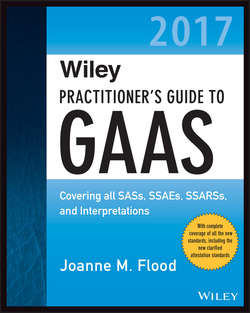Читать книгу Wiley Practitioner's Guide to GAAS 2017 - Flood Joanne M. - Страница 10
На сайте Литреса книга снята с продажи.
AU-C 200 OVERALL OBJECTIVES OF THE INDEPENDENT AUDITOR AND THE CONDUCT OF AN AUDIT IN ACCORDANCE WITH GENERALLY ACCEPTED AUDITING STANDARDS
Requirements
ОглавлениеManagement's Responsibilities
Financial statements are prepared by management with oversight from those charged with governance. GAAS do not impose requirements on management or those charged with governance, but rather an audit is conducted on the premise that management and those charged with governance understand their responsibilities. (AU-C 200.05)
Many times clients do not understand their responsibilities for audited financial statements. The financial statements are management's. They contain management's representations. The form and content of the financial statements are management's responsibility, even if the auditor prepared them or participated in their preparation.
Management also is responsible for implementing and maintaining an effective system of internal control.
Auditor's Responsibilities
The auditor's responsibilities for the financial statements are confined to the expression of an opinion on the financial statements being audited. In performing the audit, the auditor is responsible for compliance with GAAS. Under GAAS, the auditor has a responsibility to consider AU-C sections and interpretive publications in all audits. If such guidance is not followed, an auditor must be prepared:
● For AU-C sections, to justify a departure from GAAS
● For interpretive publications, to explain that an alternative approach achieved the objectives of GAAS
To provide reasonable assurance that it is conforming with generally accepted auditing standards in its audit engagements, an accounting firm should establish quality control policies and procedures. These policies and procedures should apply not only to audit engagements but also to attest and accounting and review services for which professional standards have been established. (AU-C 200.A20) The AICPA's Quality Control Standards detail the firm's responsibility for establishing and maintaining a system of quality control for auditors. See QC Section 10, A Firm's System of Quality Control, for more information.
In every audit, the auditor has to obtain reasonable assurance1 about whether the financial statements are free of material misstatement, whether due to errors or to fraud. (AU-C 200.06) Materiality is taken into account when planning and performing the audit. Misstatements are considered material, individually or in the aggregate, when they influence economic decisions made by financial statement users. Materiality considers qualitative and quantitative elements and should be viewed in context. (AU-C 200.07)
Ethical Requirements
The auditor must be independent. If not independent, the auditor cannot issue a report under GAAS. The only exception is if GAAS provides otherwise or law or regulation requires the auditor to accept the engagement and report on the financial statements. (AU-C 200.15)
To be independent, the auditor must be intellectually honest; to be recognized as independent, he or she must be free from any obligation to or interest in the client, its management, or its owners. For specific guidance, the auditor should look to the AICPA and the state society codes of conduct and, if relevant, the requirements of the Securities and Exchange Commission (SEC).2
Policies and procedures should provide reasonable assurance that personnel maintain independence when required and perform all responsibilities with integrity, objectivity, and due care.
1. Independence is an impartiality that recognizes an obligation for fairness.
2. Integrity pertains to being honest and candid, and requires that service and public trust not be subordinated to personal gain.
3. Objectivity is a state of mind that imposes an obligation to be impartial, intellectually honest, and free of conflicts of interest.
4. Due care requires the auditor to discharge professional responsibilities with the competence and diligence necessary to perform the audit and issue an appropriate report and to render services promptly, thoroughly, and carefully, while observing applicable standards.
(See the AICPA's Code of Professional Conduct, Section 300.)
Professional Skepticism and Judgment
The auditor must perform the audit with professional skepticism and exercise professional judgment in planning and performing an audit of financial statements. (AU-C 200.17-18) The auditor should:
● Observe GAAS,
● Possess the degree of skill commonly possessed by other auditors, and
● Exercise that skill with reasonable care and diligence.
The auditor should also exercise professional skepticism, that is, an attitude that includes a questioning mind and a critical assessment of audit evidence.
In practice, this means that auditors should be alert for:
● Contradictory evidence,
● Indications of fraud,
● Unusual circumstances,
● Evidence that calls into question the reliability of documents and responses to inquiries,
● The possibility of collusion when performing the audit, and
● How management may override controls in a way that would make the fraud particularly difficult to detect.
(AU-C 200.A22-A23)
However, the auditor is not an insurer, and the audit report does not constitute a guarantee. It is based on reasonable assurance. Thus, it is possible that an audit conducted in accordance with GAAS may not detect a material misstatement.
1
See Definitions of Terms.
2
Section 201 of the Sarbanes-Oxley Act of 2002 and the related SEC implementing rules created significant new independence requirements for auditors of public companies. For example, the SEC prohibits certain nonaudit services such as bookkeeping, internal audit outsourcing, and valuation services. All audit and nonaudit services performed by the auditor, including tax services, must be preapproved by the company's audit committee. In March 2003, the SEC issued final rules implementing Section 201 of the Act. The rules, Strengthening the Commission's Requirements Regarding Auditor Independence, can be found at www.sec.gov/rules/final/33-8183.htm.
